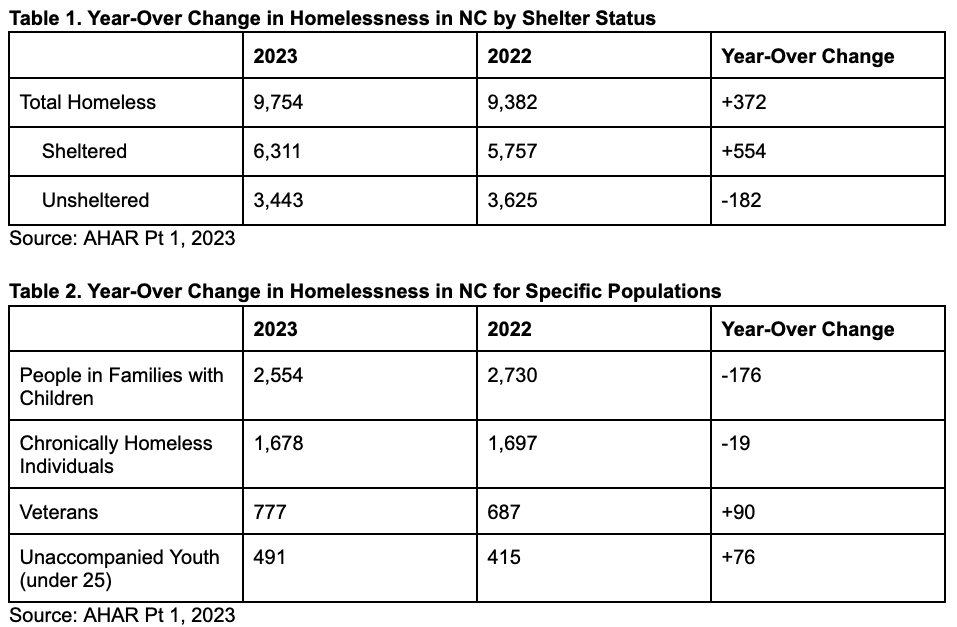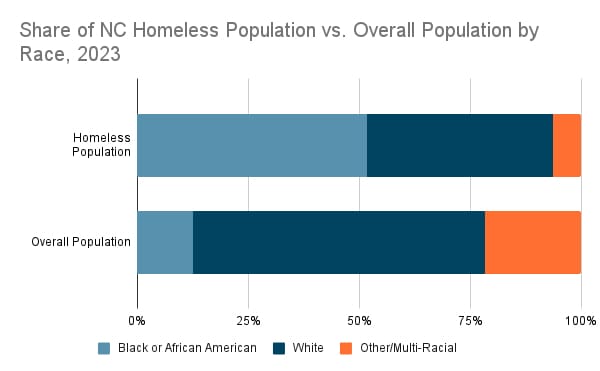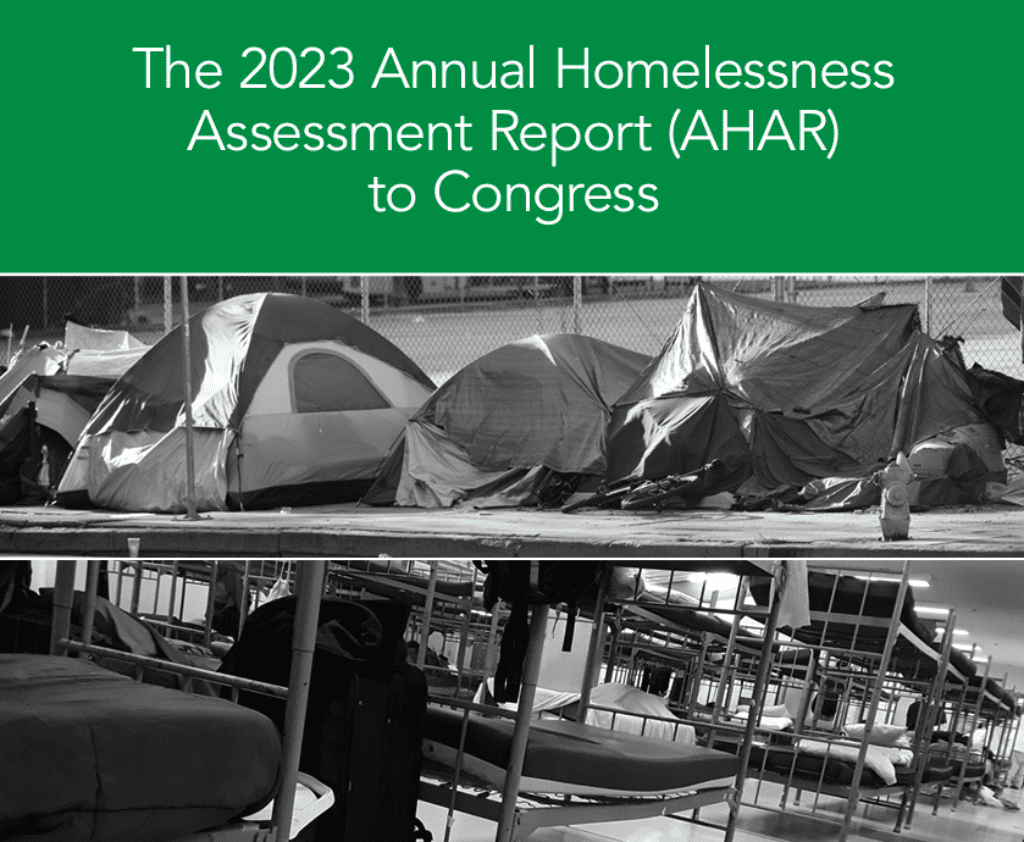
During this week’s Housing Call, Dr. Latonya Agard, Executive Director for the North Carolina Coalition to End Homelessness (NCCEH), and Rachel Waltz, Manager of the Orange County Partnership to End Homelessness (OCPEH), discussed the findings in the recently released 2023 Annual Homelessness Assessment Report (AHAR) Part 1 and recommended how to get involved in efforts to end homelessness in North Carolina and advocate for policy change.
Last month, the Department of Housing & Urban Development (HUD) released Part 1 of the 2023 Annual Homelessness Assessment Report (AHAR). This report features data from the annual Point in Time (PIT) count, which aims to provide a tally of every person experiencing homelessness and shelter inventory in each community across the US. Trends that emerge from the data inform policies, programmatic decisions, and funding for vital resources such as emergency shelters.
When asked about the importance of the PIT, Rachel Waltz explained, “It really drives home for our elected officials the state of the need as well as really generates the funding that comes back down to the local level.” In addition to the many stats and figures the PIT count provides, it also serves as a connector of people and resources. “By having such a targeted and collaborative approach, […] the PIT count provides the opportunity to reach folks who homeless service providers may not typically come into contact with,” said Waltz.
The PIT count also allows CoCs to request input from people who are currently experiencing homelessness in their communities. “For example, in Orange County last year we started soliciting input through the PIT count on our homeless system gaps,” Waltz said. “New in 2024, we’re going to be inquiring about healthcare access following last year’s Medicaid expansion.”
Trends & Highlights
Part 1 of the AHAR report provides valuable data about subpopulations and demographic shifts from year to year. Nationally and statewide, homelessness trended slightly upward in 2023. Agard noted that additional funds and protections that were enacted during the height of the pandemic helped to keep families housed in the short-term. “We had more money available and creativity. There was an urgency to keep people housed and to provide additional support resources. But many of those have been discontinued and more families, as we saw in this report, are finding themselves in unstable housing or unsheltered.”
Key National Highlights from the 2023 AHAR: Part 1:
- Homelessness in the U.S. reached record-high numbers. Roughly 657,100 Americans were experiencing homelessness – more than any previous year since HUD began collecting PIT data in 2007.
- All subpopulations (veterans, families with children, unaccompanied youth, etc.) experienced increased homelessness. For example, homelessness among people in families with children grew by 16 percent.
- The number of people experiencing homelessness who identify as Hispanic or Latinx grew by 28 percent nationwide – the largest increase this year among racial or ethnic groups. Hispanic/Latinx identifying people also made up 55 percent of the increase in homelessness this year.
Key Statewide Highlights from the 2023 AHAR: Part 1:
- The number of North Carolinians experiencing homelessness rose 4 percent from 2022 to 2023 (see Table 1). Specifically, this increase was in the sheltered homeless population. Homelessness also rose among veterans and unaccompanied youth (see Table 2).
- The number of North Carolinians experiencing unsheltered homelessness decreased by 5 percent (see Table 1). Statewide, there were also modest decreases in the number of people in families with children experiencing homelessness and chronically homeless individuals (see Table 2).

When reviewing the statewide trends, Agard noted, “These numbers remind us that intentional targeted programs that were implemented during Covid – Housing First programs that were supported in other ways, renters protection against evictions – these things can and do work if we have the political and the moral will to act on behalf of and in solidarity with people who are experiencing homelessness.”
Racial Disparities Continue Nationally and Statewide
While homelessness and housing instability is an issue that touches all demographic groups, data consistently shows disparities in who is feeling the brunt of this crisis. Similar to last year, this year’s report indicates that people who identify as Black make up 13 percent of the total US population, yet they comprise 37 percent of all people experiencing homelessness and 50 percent of all people experiencing homelessness as a family unit. At the state level, Black and African American people account for 13 percent of the overall population, but represent over half (52 percent) of North Carolina’s homeless population (see Chart 1).
Chart 1: Share of NC Homeless Population vs. Overall Population by Race, 2023

“Over half (52 percent) of North Carolina’s homeless population identifies as Black or African American, compared to 13 percent of North Carolina’s overall population.”
Data Limitations
The PIT methodology has its limits. The data provides a snapshot about who is experiencing sheltered and unsheltered homeless on the night of the count, rather than over the course of the year. Shelters that receive HUD funds are required to participate in the PIT count, but other shelters can be less willing to share their data.
In addition, counting the unsheltered homeless population is difficult. Larger urban areas often benefit from more volunteers and larger Street Outreach teams. Rural counties often lack the capacity for street outreach and accurate counts of unsheltered homelessness.
How to Get Involved
Looking to learn more about the specific needs in your community and lend a hand?
- Find your community’s Continuum of Care (CoC) on this map and reach out to your local CoC contact to see if they have volunteer training opportunities.
- Check with your local soup kitchen or shelter to see how you can best support them.
Lastly, Waltz emphasized that supporting local initiatives and homelessness outreach does not end on PIT night. “This work is a day-in, day-out job, and every community is a little different, so it’s really critical to key into your local Continuum of Care to find out what the local needs are.”
A big thank you to Dr. Latonya Agard & Rachel Waltz for joining our Housing Call this week! If you are interested in hearing more about this topic or have suggestions for others that you’d like us to dive into, please email Stephanie Watkins-Cruz at swatkinscruz@nchousing.org or Anna Patterson at apatterson@nchousing.org.
Full Speaker Bios:
 Dr. Latonya L. Agard, NCCEH
Dr. Latonya L. Agard, NCCEH
Latonya L. Agard, “Dr. A,” comes to the North Carolina Coalition to End Homelessness (NCCEH) with a wealth of leadership experience within the faith community, higher education, nonprofits, and mental health. She holds several degrees, including a BS in Chemistry and an MA in English from the University of Alabama, an MDiv from Duke University Divinity School, and a Doctor of Ministry from Louisville Presbyterian Theological Seminary. Her work in higher education focused on mentoring first-generation African American students, helping to build their capacity for resilience, and teaching at the University of Alabama, Miles College, Barton College, and Duke Divinity School. As a local pastor and church planter, she has led communities of faith to consider the dynamic relationships between Christian praxis and professions of faith. This transformative work fuels her interest in connecting the tenets of her faith with the practical needs of marginalized communities, which is partly reflected in her work to help establish ONE Wake, an IAF (Industrial Areas Foundation) affiliate in Wake County, NC, her job as a case manager for the Support Circle Program for Homeless Families, and her service on nonprofit Boards of Directors.
Integrating her skills, knowledge, and experience, Dr. A broadened her justice work by opening her business, BeSpeak Solutions, Inc. As a North Carolina Fee-Based Practicing Pastoral Counselor Associate and Transformational DEI Specialist, she provides narrative and trauma-informed mental healthcare, workshops, presentations, and consultant services. In 2021, she joined NCCEH as a DEI Consultant to begin guiding the agency through the difficult process of identifying and dismantling racism and racist practices. This collaborative relationship challenged the staff and Board of Directors to redefine its values, reframe its Mission and Vision, and craft an explicit DEI Statement. Now, as our Executive Director, Dr. A continues to lead NCCEH as we transform our workplace culture and serve homeless families in North Carolina.
 Rachel Waltz, Manager, Orange County Partnership to End Homelessness
Rachel Waltz, Manager, Orange County Partnership to End Homelessness
Rachel Waltz is a licensed clinical social worker with over fifteen years of experience providing community-based mental health and housing-focused interventions in partnership with individuals, organizations, and communities. Rachel has served as the Manager of the Orange County Partnership to End Homelessness (OCPEH) since 2021. The Partnership, funded by the Towns of Carrboro, Chapel Hill, Hillsborough and Orange County, serves as the Chapel Hill / Orange County Continuum of Care (CoC). As the CoC Lead Agency, OCPEH coordinates the homeless system, monitors program and system performance, hosts an annual funding competition for HUD homeless funds that come into Orange County, provides oversight and support for HUD funded homeless programming, and provides education, training, and support across systems such as the criminal legal system, behavioral health system, domestic violence and sexual assault service providers, education, child welfare, as well as community members, faith groups, and stakeholders. Prior to joining OCPEH, Rachel worked in community mental health at the UNC School of Medicine and at the Durham and Bronx VAs providing care to Veterans experiencing homelessness. Rachel earned a Master’s in Social Work from Columbia University and Bachelor’s in Criminal Justice and Psychology from the University of Delaware. Rachel is a proud social worker who lives with her wife and son in Durham.








